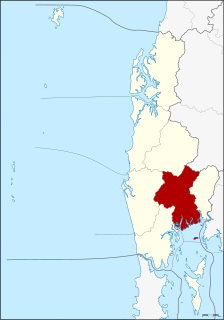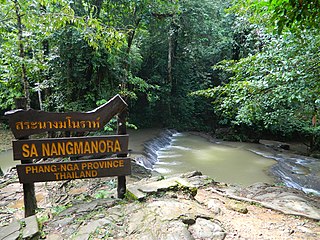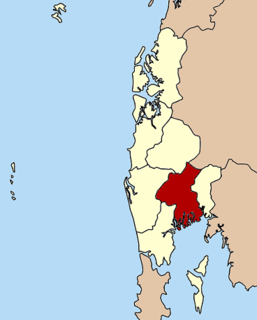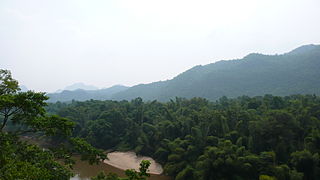
Kanchanaburi is the largest of the western provinces (changwat) of Thailand. The neighboring provinces are Tak, Uthai Thani, Suphan Buri, Nakhon Pathom, and Ratchaburi. In the west it borders Kayin State, Mon State, and the Tanintharyi Region of Myanmar.

Khao Sam Roi Yot is a marine national park in Kui Buri District, Prachuap Khiri Khan Province, Thailand. It covers 98.08 km2, of which 20.88 km2 are marine areas. The park was established in 1966, and was the first coastal national park of Thailand. The park includes Thailand's largest freshwater marsh.

Phanom is a district (amphoe) in the southwest of Surat Thani Province of southern Thailand.

Khanom is the northernmost district (amphoe) of Nakhon Si Thammarat Province, southern Thailand.

Mueang Phang Nga is the capital district of Phang Nga Province in southern Thailand.

Khao Luang (เขาหลวง) is the tallest mountain in southern Thailand. It is in Nakhon Si Thammarat Province.

Sa Nang Manora is a forest park in southern Thailand. It covers an area of 0.29 km2 of the Khao Thoi-Nang Hong Forest, Nop Pring Sub-district, Mueang District, Phang Nga Province, about four km north of Phang Nga town. It was established on 15 September 1980.

The Western Forest Complex, straddling two countries, Thailand and Myanmar, including 19 national parks and wildlife sanctuaries, is the main biodiversity conservation corridor of the region. Covering 18,730 km2, it is one of the largest protected territories in Southeast Asia. The geography of the Western Forest Complex ranges from lowlands to the mountains of the Thai highlands and the Dawna-Tenasserim Hills.

Ko Nom Sao are twin islands in Phang Nga Bay, and are part of the Ko Panyi (เกาะปันหยี) subdistrict (tambon), Phang Nga Province, Thailand.

Khao Nom Sao (เขานมสาว), "female breast mountain", is a land feature located in Ranong Province, Thailand.

The Sankamphaeng Range, also Sankambeng Range or Sungumpang Range is one of the mountain ranges separating eastern Thailand from the northeast or Isan. It is in Nakhon Nayok, Prachinburi, Sa Kaeo, Saraburi, and Nakhon Ratchasima Provinces, Thailand.

Ramkhamhaeng National Park is a national park in Thailand.
This is a list of articles related to Thailand, sorted by alphabetical order. It represents the majority of articles contained within the Thailand category. For a list of key articles arranged by topic, see Outline of Thailand.

A breast-shaped hill is a mountain in the shape of a woman's breast. Some such hills are named "Pap", a word for the breast or nipple. Such anthropomorphic geographic features are to be found in different places of the world and in some cultures they were revered as the attributes of the Mother Goddess, such as the Paps of Anu, named after Anu, an important female deity of pre-Christian Ireland.

The Phi Pan Nam Range, also Pee Pan Nam, is a 400 km (249 mi) long system of mountain ranges in the eastern half of the Thai highlands. It is mostly in Thailand, although a small section in the northeast is within Sainyabuli and Bokeo Provinces, Laos.

The Phu Langka Forest Park, or Phu Lang Ka Forest Park, is a protected area of the Phi Pan Nam Range located in Chiang Kham District and Pong District, Phayao Province, Thailand. The park was established on May 8, 2002 and covers an area of 12.48 km².

Khao Rom is a 1,351-metre-high (4,432 ft) mountain in Nakhon Ratchasima Province, Thailand. It is the highest peak of the Sankamphaeng Range, between eastern Thailand and Isan.





















